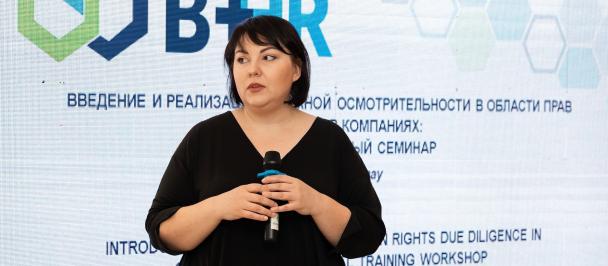From Awareness to Action: Fostering Human Rights Engagement in Kazakhstan's Business Landscape
July 6, 2023

"We believe that we know what human rights are, but as we delve deeper, we realize that this knowledge falls short. We are beginning to comprehend the issues we face, both in Kazakhstan and our region. It seems crucial to popularize this awareness among the local population and employers. By raising this topic among employees, we can motivate them to develop stronger loyalty to the company. Additionally, it benefits our population at large, ensuring they are aware of their specific rights and enabling us to address related challenges,"stated Gulmira, a participant in the Human Rights Due Diligence training program in Aktau.
The role of businesses as a global catalyst for change is increasingly acknowledged in today's world. These changes can bring about positive or negative effects on individuals and pose economic, environmental, and social risks. Responsible businesses that demonstrate a genuine interest and take action towards sustainable development goals, including the protection of human rights, gain a competitive edge in the global market. The emergence of the COVID-19 pandemic has underscored the significance of businesses' impact on people and the environment.
The United Nations Development Programme (UNDP) plays a leading role in supporting the implementation of key global standards for responsible business, namely the United Nations Guiding Principles on Business and Human Rights (UNGPs). The UNGPs consist of three pillars: the government's responsibility to protect human rights, the corporate responsibility to respect human rights, and recommendations for both parties to ensure access to effective remedies for victims of human rights violations.
While the roles of governments and businesses differ, the principles necessitate action from both sides and recognize their collaborative work. The UNGPs require businesses to conduct Human Rights Due Diligence (HRDD) to identify, prevent, and mitigate adverse impacts on individuals and the environment, thus aiding in the management of potential risks. Simultaneously, governments are encouraged to develop and implement National Action Plans on Business and Human Rights or similar policies as a prerequisite for instigating systemic change towards a responsible business environment.
To remain competitive and minimize financial, legal, operational, and reputational risks, an increasing number of businesses are adopting human rights policies and engaging in Human Rights Due Diligence. Leading economies in Europe, Asia, Australia, and the United States are enacting corporate human rights laws, thereby influencing other countries to follow suit.
In September 2022, Japan released the guidelines on respecting human rights in responsible supply chains to promote adherence to internationally recognized human rights. In January 2023, the German act on corporate due diligence in supply chains came into effect, mandating companies to implement due diligence measures. Furthermore, on June 1, 2023, in addition to national regulations on due diligence in European Union member states, the European Parliament agreed on the text of the EU Directive on corporate sustainability due diligence.
In 2022, the UNDP funded by the Government of Japan supported Japanese companies, their suppliers, and partners across countries in ensuring compliance with human rights standards within their companies and throughout their value chains. As part of this initiative, the UNDP in Kazakhstan conducted a series of training courses on HRDD in Almaty, Astana, Atyrau, and Aktau. The training attracted 115 participants, primarily from the business sector, trade unions, and non-governmental organizations.
The training course encompassed an overview of the Business and Human Rights concept, including international and local legislation pertaining to responsible business conduct. It provided insights into the HRDD procedure, presenting best practices and practical tasks for assessing and prioritizing risks within a company. Additionally, specialized sessions were held on grievance mechanisms and gender equality in the workplace.

"Tackling the concept of Business and Human Rights was of utmost importance, as grasping the fundamentals enables participants to evaluate their company's current efforts in terms of responsible business conduct and ascertain their position within this international trend. We also focused on assessing and prioritizing human rights risks within the company and its supply chain, as it is impossible to develop a Human Rights Due Diligence Plan without this crucial step,"explained Tatyana Zinovich, Acting Director of the Legal Policy Research Centre in Almaty, who served as one of the trainers.

The diverse backgrounds of the participants revealed their varying interests based on their organizations and regions. Some participants emphasized the challenges faced in their regions due to a lack of information sources.
"Living in our region, outside the capital and major metropolises, we often remain unaware of various legislative points. I attended this training to expand my knowledge and attempt to implement it in my region (Mangystau). By understanding all these mechanisms and risks, we can make informed proposals to government agencies and corporations,"shared Pavel, a representative of civil society organizations.
A number of companies found the training valuable for developing human rights policies and procedures. They highlighted the need for a clear framework to guide employees and ensure the protection and promotion of human rights within their organizations.
"While we do a lot for employees and suppliers, we lack a single document, policy, or procedure. Thus, the training proved highly useful for drafting a comprehensive policy,"expressed Zhanna, a representative from the corporate sector.
"It was crucial for us to understand the best practices and how we can incorporate them into our standards. For the first time in several years, we began scrutinizing the business reputation of our partners. We have designed a special questionnaire to ensure that we exclusively collaborate with companies committed to a code of business ethics, adhering to the best practices in anti-corruption and respecting human rights,"shared Marina, a training participant.
To facilitate widespread accessibility, the UNDP in Kazakhstan has prepared Kazakh and Russian translations of the training guide, which contains modules elucidating the process of conducting human rights due diligence. The guide emphasizes internationally agreed principles and provides a step-by-step approach, allowing businesses to embark on HRDD either as an independent undertaking or as part of an existing assessment process.

 Locations
Locations









